Dispatches From Cairo: Egypt’s Black Sunday
How can the people who made this revolution of unity have been so betrayed?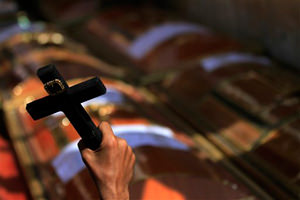
We asked Lauren Unger-Geoffroy, an Arabic-speaking American who lives in Cairo, to share her perspective of life in Egypt after the revolution. In this entry, she writes of the domestic violence that shook the nation this past weekend.
Black Sunday in Egypt: How can the people who made this revolution of unity have been so betrayed?
It all started as a peaceful, if vociferous, protest in Shubra, with thousands of Christians as well as Muslim activists marching to Maspero, the large downtown Cairo building near Tahrir Square that houses the Egyptian national radio and television. When the march was at the Shubra tunnel, rocks were thrown and gunshots were fired in the air by unknown people. This angered the crowd, which resumed the march after taking cover briefly. Suddenly, in front of the Al Ahram newspaper building, there was an uproar when more gunshots were fired in the air. Maspero erupted. The military police took the offensive. Protesters and the police officers hurled rocks and shot at each other, and Molotov cocktails streaked through a haze of tear gas.
“This is our country,” protesters chanted.
Suddenly, there was a stampede. Two armored personnel carriers (Humvees supplied by U.S. tax dollars) sped through the protesters, who tried to jump out of the paths of the zigzagging vehicles. Soldiers perched on the Humvees spun guns, shooting into the crowd. Then one military police vehicle mounted the curb of the central island where most in the crowd had fled and ran over a large number of the protesters. In response, angry demonstrators beat up some soldiers.
Egyptian state television clearly fueled this violence by using sectarian language, referring to protesters as “the Copts” and broadcasting statements such as “The Copts have killed two soldiers.”
At the same time, the military cut the live feeds of several satellite TV stations, including 25TV, al-Hurra, an American-owned Egyptian station, and, at a later point, Al-Jazeera, blocking independent reporting of the events taking place.
National TV presenters urged Egyptians to “protect the army of Egypt from the Copts” and reported variously that three police officers or two soldiers had been killed by the Christian protesters. At one point they said, absurdly, that the Copts were armed with machine guns! It was manipulation of the masses; the people know it is being done, but still go along with it. Throughout came unverifiable allegations and talk of “foreign agendas,” “outside hands” and “hidden outside influences.” Manipulative techniques like these have been used effectively on Egyptians for many years. ENTV, showing unclear images of the demonstration, stated that armed Christians were on the attack and that “the good people should go down to Maspero and defend our military against the Copts — in the name of Allah!”
A local resident reported groups of young men arriving and chanting sectarian chants and pro-army slogans.
In whose interest is it to have this country broken and its people disunited and weakened by irrational, violent ethnic conflict? Who will benefit from that?
Sunday’s mayhem grew out of a demonstration against the Sept. 30 burning of a Coptic church and a fight over the rebuilding of a church that had been attacked by military members who were supposed to be protecting it and by plainclothes thugs. There was some rock-throwing between people from Shubra, a hot sectarian area always ready for a fight. Yes, some people in the march were wearing white aprons that said “Martyr on demand.” There also were old ladies with crosses.
Most of the scuffles that occurred between the followers of the two religions were confusing, as are all Egyptian Christian-Muslim scuffles. An observer couldn’t tell who was doing what to whom. It’s hard to identify the sides unless you can see the discrete cross tattoos on the Christians.
The army was out in large numbers, and some plainclothes thugs, like dog packs, insinuated themselves into the mix. In the end, an estimated 24 people were killed and about 250 were injured.
Inside the hospital there were hundreds of people. The morgue and the emergency room were crammed with people screaming and crying, smashed heads and faces, mutilated bodies piled on the dirty, blood-soaked floor. The coroner said 10 of the dead had been crushed under vehicles.
Outside, the battle was still going on.
Analysts of various persuasions blamed every possible element and political party. Potential presidential candidates Abdel Manam Abu El Fatouh and Mohamed Salim El Awa both said they believed it was an attempt to kill democratic transition in Egypt.
As to be expected, many officials, politicians and commentators pointed a finger at foreign parties. This is convincing: Who would benefit by breaking Egypt down to its lowest instincts besides those wanting to control the country — Saudi Arabia, Israel, Iran, USA, Russia, China … “invisible hands”?
If it is the military or the disguised old National Democratic Party regime (“Mubarak’s Children”) who are sabotaging the possibility of a cohesive and democratic Egypt, if they would destroy all hope of the country’s success in order to retain/regain control to preserve their interests, then it is the most coldblooded, cynical, barbaric, misguided plan imaginable. It would be too evil for the simple Silent Majority to conceive of.
Several Egyptian TV hosts and news anchors have resigned from Egyptian TV, disgusted with their station’s coverage of this event and charging online that Egyptian national TV was calling for a civil war.
On Monday there were hundreds at the funerals and processions for the martyrs killed Sunday. [Later, international media reported that three members of the army had been killed.]
These are days of mourning in Egypt. The Coptic pope has called for a three-day fast to mark this tragedy. The Cairo Opera House announced it will suspend performances in its theaters for three days.
Students gathered Monday at midday, chanting in the street below my apartment. Some shouted, “The people and the army are one hand”; others, “Muslims and Christians are one hand.” After a while they all were chanting “one hand … one hand … one hand.”
Monday night there were people shooting guns in my neighborhood to celebrate the big football game that took place despite everything that had happened. The cheers sounded so similar to the roaring of the protesters in the battle on Sunday.
The local guys who watched the game on a TV outside the shoe store on the corner were able to distract themselves from the general despair. The people around here are not sectarian. They are struggling and poor, and some are from the countryside. Some are illiterate, but they have the souq (market) and they have enough. They pray, they are easygoing, their fights are mostly over marketplace conflicts. This tragedy has depressed everyone and ruined hopes for the smooth transition of power, but the sectarian issues are outside the life concerns of most and they will get over it all soon, inshallah.
The call to al fajr morning prayer at 4:30 was particularly beautiful on Monday. It was a prayer for this unhappy moment, soft and calming. Now, the neighborhood street dogs are barking in the square below my window. I will go to sleep if I can, like the millions of others who will sleep after praying and before the sun rises, when we must look at what is in front of us.
The blood is on our doorstep.
We need to know what it means.
Your support matters…Independent journalism is under threat and overshadowed by heavily funded mainstream media.
You can help level the playing field. Become a member.
Your tax-deductible contribution keeps us digging beneath the headlines to give you thought-provoking, investigative reporting and analysis that unearths what's really happening- without compromise.
Give today to support our courageous, independent journalists.

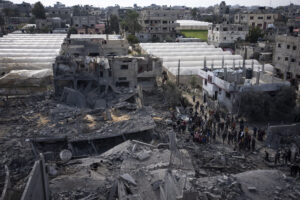
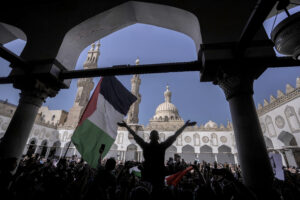
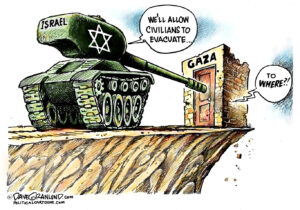
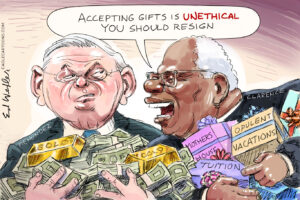
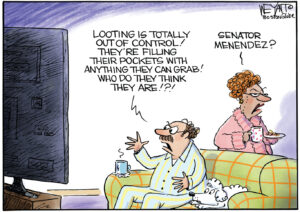



You need to be a supporter to comment.
There are currently no responses to this article.
Be the first to respond.